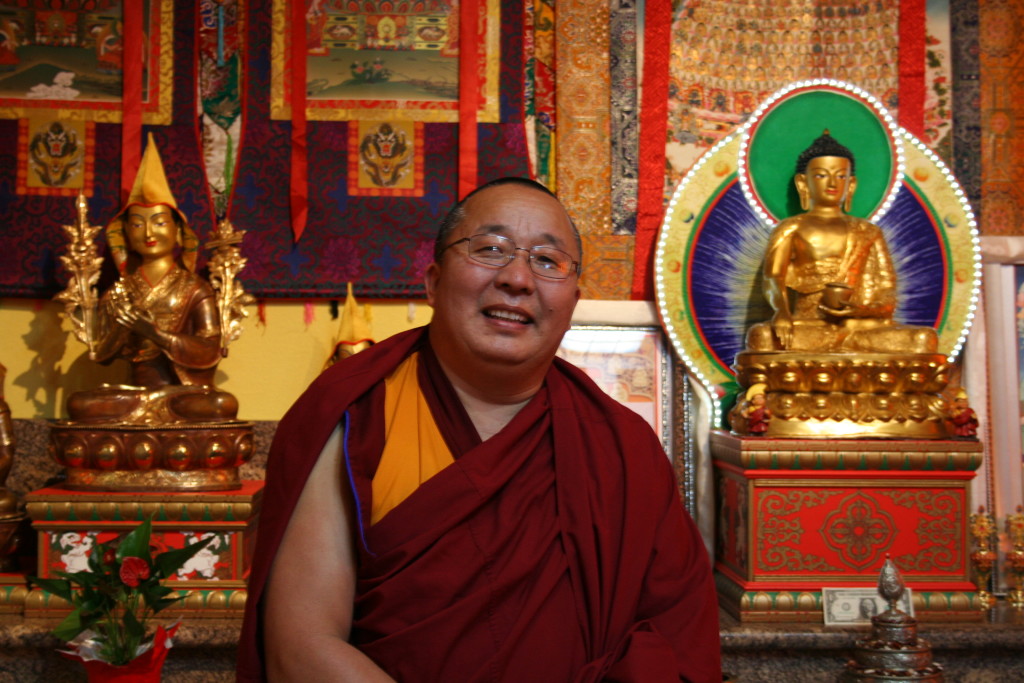“I was born in Mongolia in 1967. Because Mongolia is a Buddhist country, we often went to the Buddhist temple when I was a child. Later, I decided that I would like to become a monk, but first I had to study the Tibetan language for two years. When I finally became a monk, my family was very happy. I am the only monk in our family. My mother was especially happy when I went to India, and she told me not to come back before I pass the Geshe exam. Now my parents have passed away, but I still have a brother and sister in Mongolia. I do miss them. Sometimes we talk on the phone, but often I meet them in my mind… that’s very easy!”
“When I first came to India, everything was different from Mongolia, the weather was very hot, the food was different, I had to study a lot, and I didn’t speak much Tibetan. But I had a very good teacher. My teacher told me that when he first arrived, his mind was like a mouse mind, very busy, but over time he became an elephant, meaning he developed a very strong mind. He told me that at the beginning things will be very difficult for me, but once I have a lot of experience, I will have a strong mind like an elephant. It took me eight or nine years to go from mouse to elephant.”
“At the Buddhist University in India life was not easy. A lot of monks lived in a small place, we didn’t go anywhere, there was not much change, just studying and sleeping. Twice a year we had exams. In January we were finished, and then we celebrated the Tibetan New Year. Tibetan New Year is a very happy time. We’d even sing Mongolian songs. The food was very good. Sometimes we’d go to Dharamsala to receive the Dalai Lama’s teachings.”
“I came to Sacramento, because the Mongolian people in this area requested a monk. So my teacher in India asked me to go. Life in the United States is very different. It’s easy to live here. Actually, it doesn’t matter where I go, I am okay. I am a monk, I have morality, I study, I practice. My aspiration in life is to teach other people the Dharma. To educate people about Buddhism. Maybe not talking about Buddhism in a complicated way, but in a way that is easy to understand. How to take refuge, how can Buddhism help you, the importance of compassion, loving-kindness, patience, etc. And I want to create a peaceful place for people to come and meditate.”
“I feel happy when I think about the Dharma, when I meditate… and sometimes when I drink Indian tea.”
“If a non-Buddhist came to me to learn about Buddhism, I would talk to him or her about mind training. I would tell her not to focus only on herself but to open her heart to all sentient beings. When you have an open heart, all people are the same. We are all sentient beings. Every morning I pray that all sentient beings may be happy, don’t suffer, stay healthy, and have a long life. First, I ask my teachers to bless me, and then I bless all sentient beings.”
“If anger arises in me, I don’t talk. I extend loving kindness and compassion. If other people speak strongly with me, want to hurt me, I don’t blame them. I think that this person is maybe confused or angry, and is suffering. If both of us are angry, a big fire can start. So I don’t talk. Maybe sometime in the future, when things calmed down, I will talk to him or her.”
“The middle way is very good. If you are too happy or too sad, your life gets difficult. Sometimes people go from very happy to very sad in a short amount of time. But if you consider karma and impermanence, you can stay peaceful.”


